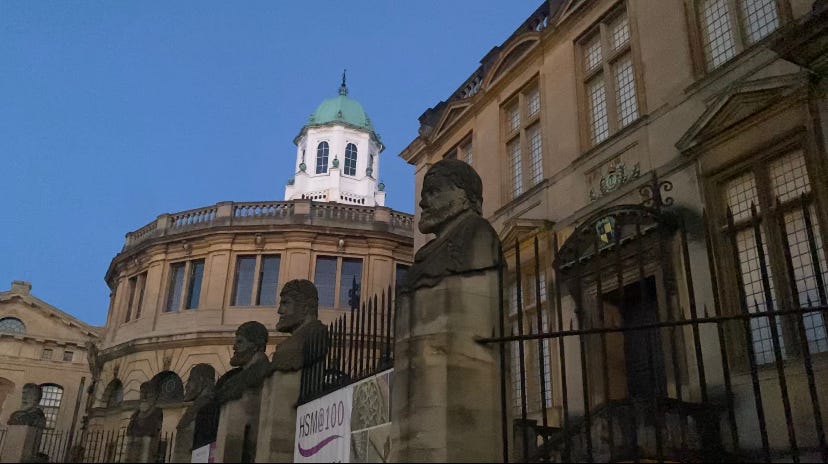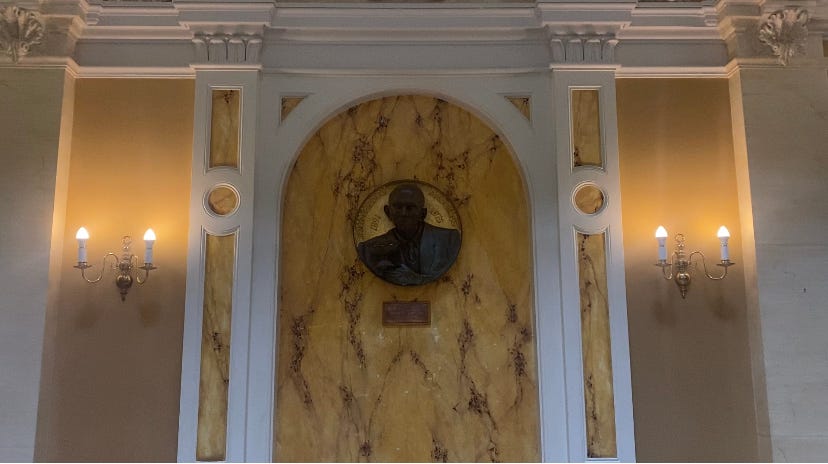Ethical Exploration: Unveiling Oxford's Ghost Tours
With a millennium-long legacy, Oxford's shadowy streets harbor untold tales, whispered through ghostly echoes - but how do we enjoy Oxford's ghoulish past in an ethical manner?
Empress Matilda, the royal trapped in a castle by her cousin, whose only escape was through a window and across an icy river. Betsy Richards, whose coroner stated that her body had been the worst he had ever seen in his career. The Silent Woman who lives in St. Giles churchyard, whose dying wish was not respected by her family. These are just examples of a few women who met their end a multitude of years ago but can still be seen around Oxford, albeit in ghost form, but we never hear their stories.
The century-old city that is Oxford is home to the oldest university in the UK. It would be no surprise that ghost sightings are common within these grounds. Whether it be academic ghosts discussing the wine in Ancient Greek at a city centre pub, or an old librarian haunting the bookcases he previously tended to in the 17th century. Oxford has it all. Paired with the university buildings that glow at night with unknown, ominous energies, Oxford City Centre is the hub for ghost tours.
But that poses the following question; How do we share ghost stories while honouring the dead that is presumed to still be among us? Are ghost tours as a whole unethical? Jess Worth, also known as Lady Gargoyle, is an Oxford Green Badge tour guide who has shed some light on these questions.
Ghost tours are a form of entertainment for the public. People pay for ghost tours to feel entertained, rather than attend educational and historical tours and feel educated after attending. However, it is crucial to remember that ghost stories are true stories. These ‘tales’ are derived from real people who, most often, died in gruesome manners. Whether people believe in ghosts or not, it is a widely accepted understanding that real people’s traumatic stories should be respected and retold respectfully. Worth comments that ghost tour guides often move “into the realms of being a magician.” Instead of this approach, Worth prefers to stick to retelling Oxford’s historical past, playing on the existing ominous atmosphere of Oxford at night and only going as far as donning herself with a cape and dark makeup. She relies solely on Oxford’s gruesome past to serve as entertainment for her tours, sharing that “for me, it's really important to tell the stories correctly, and as they happened … and to try and learn a little bit about the history of Oxford from that.”
When asked about what ethical considerations she takes when planning and holding ghost tours, Worth shared that she pays close attention to the stories that she chooses to tell. One thing Worth considers is how recently the ghost passed away; “I wouldn't tell them a modern story. I wouldn't talk about a recent death. If there's anybody still alive that remembers the person who died. Then I don't think it would be ethical to talk about that.” Ghost stories themselves can be upsetting due to the overriding theme of death. Finding the right stories, that haven't been told by every other tour guide can be hard, so guides may take a closer look at more recent deaths that have supposedly resulted in ghosts. This brings forward the ethical issue of exploiting a person’s story who may still have family that is alive, well and within the audience.
Another ethical point to consider is the ghosts themselves. History books are heavily populated by the triumphs of men, kings and knights, which often erases the feminine presence that was very much there. Ghost tours face a similar fate. Worth wanted to ensure that she included stories about women in her tour, but did not want to be exploitative. “Most of the ghost stories about women that I found were women killing themselves or dying of broken hearts after their men go off to war and don't come back” she shares, “But I was a little bit concerned about that balance, and so I've ended up adding in a story that you wouldn't normally find on a ghost tour. Which is the story of Anne Green.”
In 1650, Anne Greene was hanged for the concealment of her miscarried child who had been born out of wedlock. However, when Thomas Willis, the coroner, received her body, he found a pulse and proceeded to revive her and she survived. Whilst this isn't exactly a ghost story, Worth chose to include it as it uplifted women. Furthermore, it also comments on the current gender-political climate since the Roe V Wade case. “I'm always a little bit aware when I tell that Anne Green story that there might be women in my group who've had miscarriages, and that might be potentially a little bit uncomfortable for them. So I'm quite careful about how I tell that story.”
Overall, the biggest question to consider is whether an ethical ghost tour can still be entertaining. When asked whether Worth believed that ghost tours as a whole were ethical, she replied; “I can only really speak to my ethics. The thing about tour guiding is that those who are accredited as Green Badge tour guides, we have professional standards that we all adhere to.”
Ben Freeman, host of The Quantum Mechanics podcast and paranormal enthusiast, spoke on the ethics of dark tourism as a whole, sharing that he does not believe it to be unethical; “I think that most stories involve people from the distant past, or not humans at all - if it's recent past, then I think one should be sensitive to that - but I would say that true crime tours are more problematic because folk often want the gore, rather than a 'harmless' ghost that may or may not exist.”
Living in a day and age where we are now more vigilant of the ethical background of the content we consume and support, should dark tourism and ghost tours be put under the spotlight? Or are they a form of entertainment that should be remained untouched?





